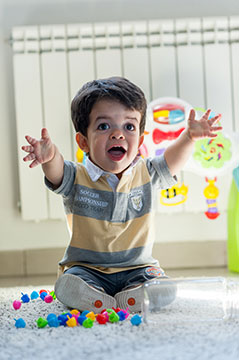Miguel, living with achondroplasia

Miguel is a young boy living in Spain. Before Miguel was born, his parents Macarena and José did not know that he would have achondroplasia, the most common form of dwarfism. In fact, it took some time for them to receive an accurate diagnosis. As with any parent, they were overcome by fear and uncertainty. “Fear of the unknown, because no one tells you or informs you about anything. So then, you are a little scared and a little uncertain. You think much further beyond the present and start to re-analyze all these ideas, like, what will he do when he’s older? When he goes to school? How will he relate to people?” says José.
Shortly after his birth, Miguel began experiencing health complications and was slow to reach certain developmental milestones. He had a very intense muscular hypotonia and could barely move. At nine months, he was diagnosed with cervical spinal stenosis, which is the narrowing of the foramen magnum. Miguel faced the risk of becoming paraplegic or dying with any physical movement. Doctors recommended that Miguel undergo surgery, and while its success was not guaranteed, it was the only option.
The surgery was successful, and just months after, Miguel began experiencing rapid and positive signs of growth. At 15 months, he was starting to move and was able to support his own head. Today, with the help from physical therapy, osteopathy, and swimming, Miguel is continuing to see significant improvements.
And as for Macarena and José, there is less fear and uncertainty. As they continue to learn more and meet other families living with achondroplasia, they’ve been able to grasp and accept the realities of living with achondroplasia and have learned to enjoy their new normal. The ALPE Achondroplasia Foundation, in particular, has been extremely supportive and helpful. Macarena recalls, “They are the ones who finally said, ‘It’s not a big deal. From the very beginning, we just have to work on it and be alert to certain things and certain problematic issues that these kids might have, but he’s going to be a kid who will be able to get everything he wants. He will get to do it all.’”
With that in mind, Macarena and José have been focused on what matters most to them – preparing Miguel for the future by loving him, making him stronger, raising him with high self-esteem, and most importantly, making him happy. Macarena shares, “All I want is for him to be a happy boy, for him to smile.”
Advice they would give to a family who just found out that their child was diagnosed with achondroplasia? “Live in the moment because the days go by and your little ones’ lives go by, and if you’re worried all the time, that time is lost. It is difficult, but you have to try to take advantage of the moment, and I believe that with work and effort, things will work out,” advises José.